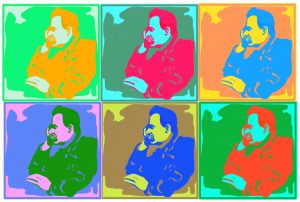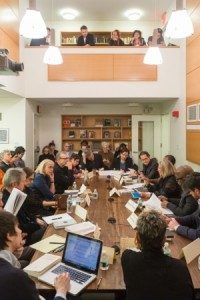Introducing Nietzsche 13/13
“With few exceptions, my company on earth is mostly Nietzsche,” Georges Bataille declared in the opening passages of his book On Nietzsche, published in 1945—adding a few lines later, “Nietzsche is the only one to support me.” Decades later, Michel Foucault would return to Nietzsche in his Rio lectures of 1973 to challenge “the great Western myth” of the separation of knowledge and power: “This great myth needs to be dispelled,” Foucault declared. “It is this myth which Nietzsche began to demolish by showing… that, behind all knowledge [savoir], behind all attainment of knowledge [connaissance], what is involved is a struggle for power. Political power is not absent from knowledge, it is woven together with it.” And a few years later, Luce Irigaray, Hélène Cixous, and other critical thinkers would engage Nietzsche’s work from a different direction to instigate a new “écriture feminine.”
Friedrich Nietzsche, one of the great masters of suspicion from the nineteenth century, radically challenged the way we think and engage the world. Nietzsche’s writings and thought had a tremendous influence across the disciplines, upending many—especially philosophy, political thought, philology, and critical theory—and significantly marking others, such as law, anthropology, and the humanities. A number of contemporary critical thinkers in the 20th century—Martin Heidegger, Georges Bataille, Maurice Blanchot, Aimé Césaire, Léopold Senghor, Hannah Arendt, Frantz Fanon, Gilles Deleuze, Michel Foucault, Sarah Kofman, Luce Irigaray, Hélène Cixous, Jacques Derrida, Ali Shariati, and others—drew inspiration from Nietzsche’s writings and developed a strand of critical theory that has had great influence in disciplines as varied as history, law, philology, and the theory of science. These twentieth century thinkers helped forge a unique Nietzschean strand of contemporary critical thought.
In some disciplines, such as philosophy and political theory, the critical influence of Nietzsche’s thought has been analyzed and explored along many dimensions—epistemological, moral, political, and aesthetic, among others. In other disciplines, though, Nietzsche’s influence has been less well understood and studied. As Peter Goodrich and Mariana Valverde note, in their edited collection Nietzsche and Legal Theory: Half-Written Laws (Routledge, 2005), many other scholars have read Nietzsche “not so well,” “rather hurriedly, and through secondhand accounts.” As a result, certain disciplines have missed some of the central critical insights of Nietzsche—including his trenchant critique of “the timeless transcendent value of natural law theory,” as well as his equally cutting critique of “the comparably timeless Kantian ideal of freedom.” (Goodrich and Valverde, at 2).
The purpose of this seminar is to explore the rich tradition of contemporary critical thought that has emerged in the wake of Nietzsche. In other words, to explore Nietzschean critical thought in contrast, say, to the Marxian or Freudian traditions. Indeed, there is a rich current of contemporary critical thought that has been nourished throughout the twentieth century on the writings and thought of Nietzsche. Most of us are familiar with the critical theory tradition of the Frankfurt School; we are familiar with the psychoanalytic tradition as well. But what of these critical thinkers who engaged with Nietzsche? Surely, they do not constitute a school. Many never belonged to anything, nor wanted to. Many tended toward limit experiences, many towards forms of anarchism, many of them were at the extremes of society and politics. Yet much of their critical thought can be glimpsed today in the interstices of recent social movements, such as the Occupy Wall Street movement or, now, in Paris, “NuitDebout.” There are even, today, eerie resonances in the non-conformity of certain political candidates in the United States and abroad. What should we make of these influential, sometimes eccentric, and surely idiosyncratic critical thinkers? Would it be possible to imagine continuities amongst the differences between them?
The seminar will proceed through a close reading of the writings on or influenced by Nietzsche of Heidegger, Bataille, Blanchot, Césaire, Senghor, Arendt, Fanon, Deleuze, Klossowski, Foucault, Kofman, Derrida, Irigaray, Cixous, Shariati, and others, with the purpose of excavating critical insights across the disciplines and formulating a coherent Nietzschean strand of contemporary critical thought. The seminar will focus on 13 critical thinkers in particular and their surroundings—some of whom drew inspiration, others resisted Nietzsche’s thought, others conversed with yet other thinkers–including:
Martin Heidegger (Sept. 8, 2016)
Georges Bataille (Sept. 22, 2016)
Maurice Blanchot (Oct. 13, 2016)
Gilles Deleuze (Oct. 27, 2016)
Hannah Arendt (Nov. 10, 2016)
Aimé Césaire (Dec. 15, 2016)
Sarah Kofman (Jan. 5, 2017)
Frantz Fanon (Jan. 19, 2017)
Michel Foucault (Feb. 9, 2017)
Luce Irigaray (March 2, 2017)
Jacques Derrida (March 23, 2017)
Hélène Cixous (April 13, 2017)
Ali Shariati (April 27, 2017)
Each seminar will be lead by two invited scholars, one from outside and the other from within Columbia University, as well as a commentator. Each seminar will follow a similar format, beginning with a short introduction of the readings and guests, followed by two short guest presentations (15-20 minutes max each) and a commentary (10-15 minutes max), and then open discussion with the participants for over an hour. The sessions will begin promptly at 6:15pm and will end promptly at 8:45pm. The format, then, will be as follows:
6:15pm Introductions
6:25pm Presentation by outside guest
6:45pm Presentation by Columbia guest
7:00pm Commentary and questions
7:15pm Open discussion and comments
8:30pm Closing remarks of the guests
8:45pm End of the seminar
Welcome to Nietzsche 13/13!
A CCCT series continuing Foucault 13/13
The seminars will be open to all. If you are interested in attending, please inform us by sending an email explaining your interest to Anna Krauthamer at ak4035@columbia.edu.


